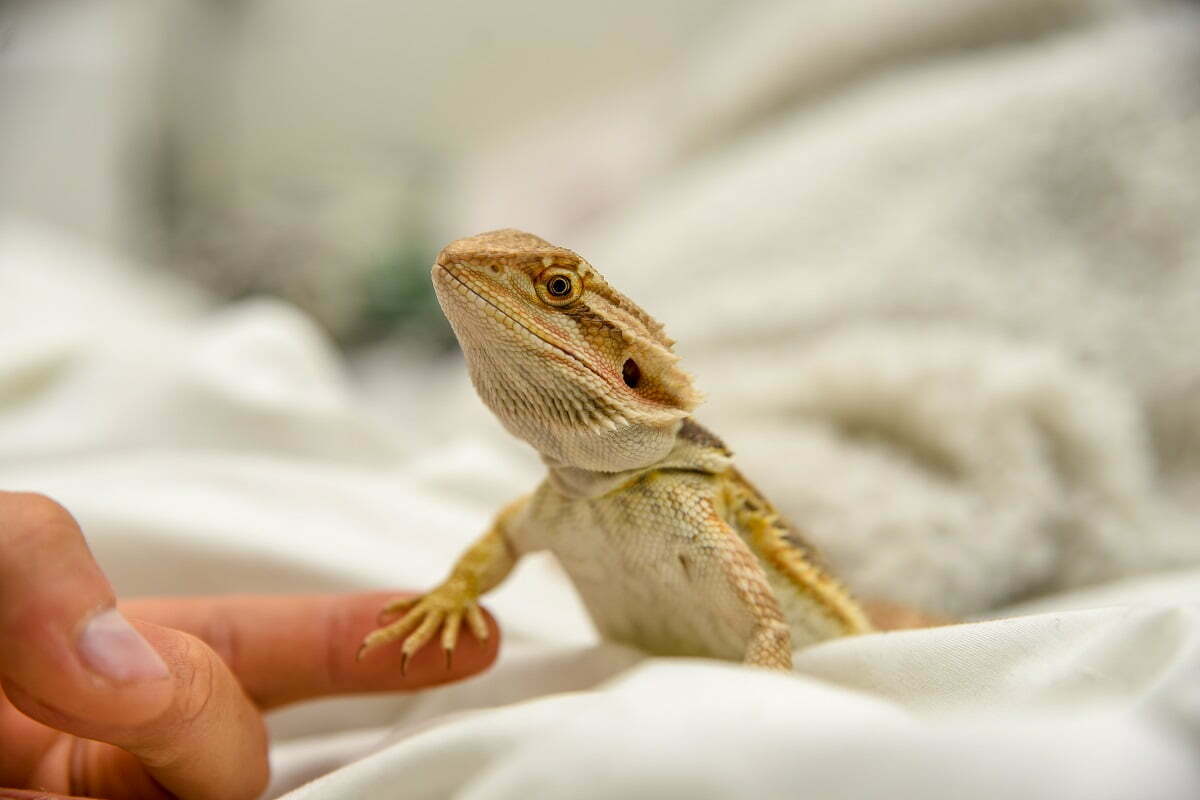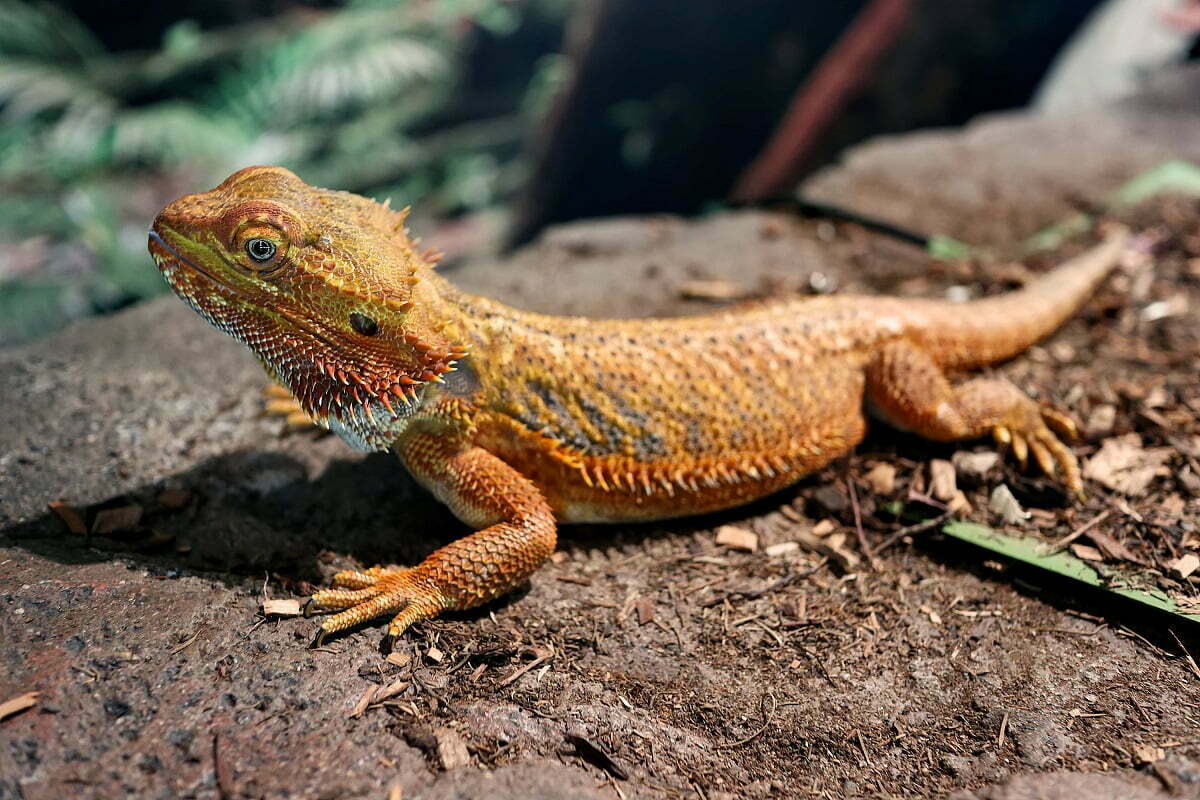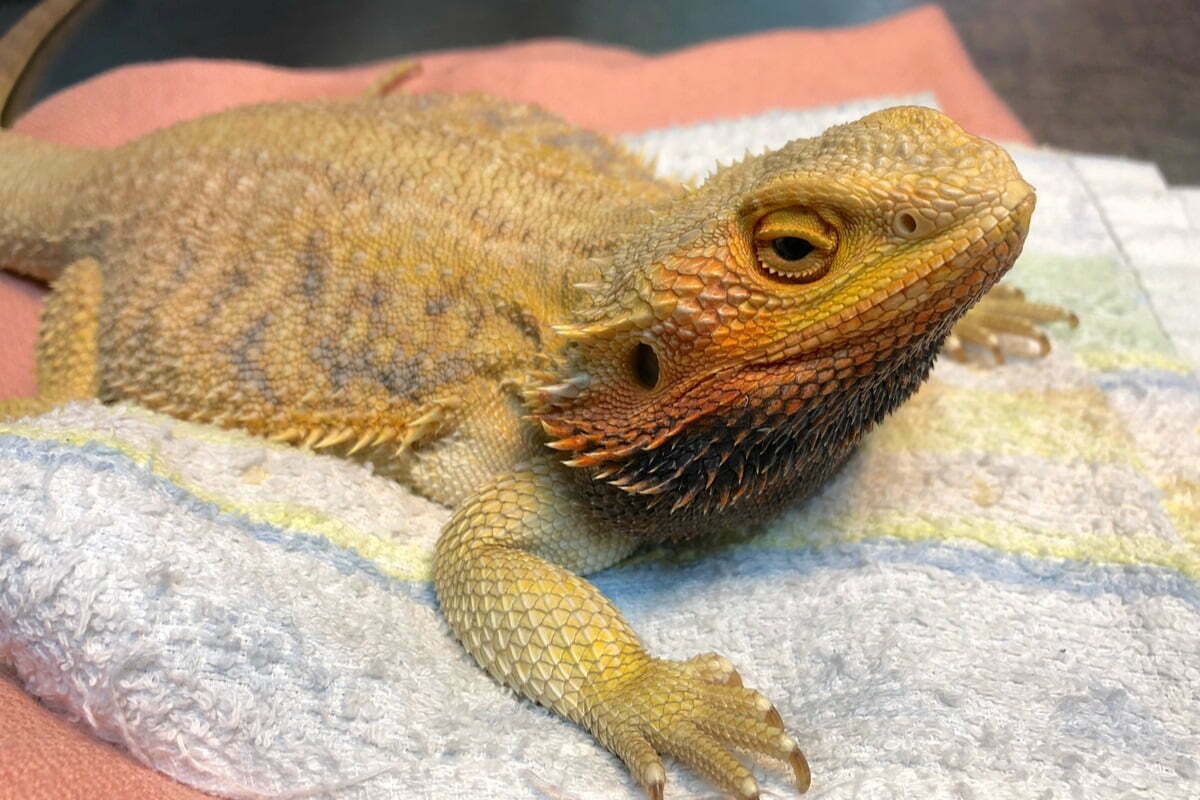Bearded dragons are cute, but sometimes they do things that confuse us. Some dragons like to hide away for seemingly no reason, and others shake.
If you have a bearded dragon, and you’ve noticed it shaking, you’re probably wondering what it means. There are lots of strange behaviors that you need to learn about as a bearded dragon owner, and shaking is just one of them.

If you want to learn about why your bearded dragon is shaking, stick with us. Here, you will learn everything you need to know.
You might be surprised by the reason behind your dragon’s shaking, and chances are, you will need to make a change very soon.
Shaking Beardie
Shaking, though it might sound cute, is not a good thing. Your bearded dragon should not be shaking at any point.
If you notice that your dragon has suddenly started shaking for no reason, you are going to have to look into the issue. There could be a number of things that could be causing it, and it’s your job to figure out which one it is.
If you notice your bearded dragon shaking, you should not take it lightly. Healthy beardies do not shake. Your dragon could exhibit this behavior for hours, or even days, if you don’t get to it quickly enough.
As soon as you notice that your bearded dragon is shaking uncontrollably, you must act fast to stop it.
The First Thing You Should Do
The first thing you’ll want to do is check the surroundings. Does your bearded dragon seem stressed, or does it always shake when it’s in its cage?
These are two signs that something may be wrong, so if you see either of these, you need to pay close attention. It could be that your bearded dragon is feeling a little anxious because there is an annoying noise nearby.
You should also review what food your dragon gets. If you are feeding your beardie the wrong food and supplements, they could start shaking.
Sickness is the main reason why your dragon could be shaking, and that is typically linked to diet and the environment. We will go through everything down below.
You Are Using Incorrect Lighting
In order to thrive, bearded dragons need the correct lighting. If they don’t get proper lighting, they can become disoriented, and that leads to anxiety. This is something that should never happen to any pet.
If you are using fluorescent bulbs instead of natural light, then you are making it harder on your furry friend. The only way to ensure that your bearded dragon’s health is thriving is to use the right lighting.
This point is strongly linked to the possibility of your dragon having a calcium deficiency. Why? When beardies don’t get enough light, or when the wrong lighting is used, they cannot process calcium in their body.
When this happens, their bones will soften, and they will start to shake.
Proper lighting is a crucial part of keeping a beardie healthy. Having the correct lighting will also mean that your pet will stay warm and comfortable. As cold-blooded creatures, beardies rely on light to function properly.
If you are not able to provide the appropriate lighting, you should not have a dragon.
You Are Using A Bad UVB Bulb
UVB lighting is critical for beardies. This lighting is needed in order for the dragons to produce vitamin D, which is, in turn, needed to process calcium.
Unfortunately, there are so many UVB bulbs that are actually no good for beardies, or any other kind of animal. Many bulbs do not have the correct output to impact your pet positively.
Not sure which UVB bulb is any good? You can check out this one for your beardies UVB bulb needs. It’s important to remember that you should switch your bulbs every year.
This is because the bulb’s strength decreases over time. If you are able to, switching bulbs every 6 months is even better.
That way, you can be sure that your beardie is always getting the lighting that they require to stay healthy and happy.
They Have A Calcium Deficiency
Your bearded dragon could also have a calcium deficiency. Since calcium is so essential to these creatures, it is vital that they get enough of it and also have the right lighting to process it.
But most indoor bearded dragons don’t get enough calcium. They usually end up with lower levels of calcium in their bodies. When this happens, they will often shake as well.
So, make sure that you are providing your beardies with all the food and supplements that they need.
If they are receiving the right amount of calcium, you may notice that they feel calmer and more relaxed. To keep your beardie feeling well, you should look into getting them some calcium supplements.
The best thing about supplements is that you know exactly how much your pet is consuming. This means that you will be able to see if your pet is really absorbing the calcium.
If you fail to give your beardie enough calcium, they will end up having deformed bones. Dusting the insects, you feed your beardie probably isn’t enough, either.
In the wild, bearded dragons would consume calcium-rich dirt if they felt like they weren’t getting enough. This means that the reptile carpet or newspaper in the tank won’t be any good to them.
You can overcome this issue by ensuring that you have a bowl of calcium in the tank. When your pet feels like they need more calcium, they will simply help itself. Nature is smart like that!
Realistically, you shouldn’t be putting substrate in your tank for your beardie to eat. Instead, you can get a sepia bone and place it in the tank.
Ideally, you can crush it up and leave it in a separate bowl for the beardie to help themselves to.
As long as you have a calcium source that your dragon can have, it doesn’t matter if you forget to dust your feeder insects occasionally. Your dragon is smart enough to know what their body needs and get it.
They Have Vitamin Poisoning

Shaking can also be caused by vitamin poisoning. Bearded dragons can get vitamin poisoning when they are given too much of a vitamin.
And since vitamins are essential nutrients, you want to make sure that you aren’t giving your beardies too much of them. Too much vitamin A – specifically – can cause shaking.
This is because vitamin A is an antioxidant. When your beardies see that they are getting too much of this vitamin, they start making free radicals—these free radicals damage cells and tissues within your pets’ bodies.
Beardies are very sensitive to vitamin A. If you suspect that your pet has been poisoned by vitamin A, you should take action immediately.
Before giving your beardie any kind of vitamins, you should always make an appointment with your local reptile vet. Then, you will discuss how much powder your pet should be receiving.
This will all depend on how old the dragon is, how much they weigh, and a few other factors.
They Aren’t Getting Enough Vitamins
A lack of vitamin B is typically the reason for a shaking bearded dragon. While supplements are great for these animals, you need to be careful how much you give them.
Multivitamins are the best bet, but once again, always check with your reptile vet first,
They Aren’t Eating Their Greens
Greens contain vitamins that are necessary for a bearded dragon. These animals should actually be consuming more greens than insects, and that is a common mistake for first-time owners!
Unfortunately, there is a lot of information on the internet that simply isn’t true, especially when it comes to a beardie’s diet.
As an owner, you need to ensure that your beardie is eating enough greens. If you don’t give them greens, after a while, they could simply refuse to eat them.
This is because they feel like they aren’t getting enough nutrition from them. So, as soon as you notice that your bearded dragon isn’t eating its greens, you need to do something about it.
Metabolic Bone Disease
Metabolic Bone Disease is a terrible disease that some bearded dragons suffer from. This can happen when they consume high amounts of calcium or phosphorus.
Either of these minerals can increase the risk of metabolic bone disease. Therefore, you should keep an eye out for signs of this condition in your bearded dragon. You should also speak to your veterinarian about this issue.
If your bearded dragon starts showing symptoms of metabolic bone disease, such as losing weight, having trouble walking properly, being lethargic, or acting sluggish, you should seek medical attention right away.
Metabolic bone disease can be deadly if not treated quickly and correctly.
The best way you can tell if your bearded dragon is suffering from metabolic bone disease is through a blood test. It is a simple process that can be done at your local reptile vet.
However, you may also be able to tell simply by looking at your dragon. You will notice the clear signs. If you are concerned about this, you should take your dragon to the vet as soon as possible.
When it comes to metabolic bone disease, it’s important to remember that it is caused by too much calcium and a lack of proper lighting.
Without the correct lighting, your dragon will be unable to process the calcium. When this happens, the disease will have a detrimental effect on them and even lead to their death.
Parasites
Parasites could also be responsible for your bearded dragon shaking. There are many types of parasites that can affect bearded dragons. The most common ones include roundworms, tapeworms, mites, and fleas.
There could be a number of other side effects you notice if your bearded dragon has parasites, too. Always keep an eye out for strange behaviors or signs of irritation.
The sooner you can get the issue resolved, the happier your dragon will be.
You Should Be Gut Loading
Gut loading refers to the act of feeding crickets and hoppers good, healthy food. These insects will be fed to your beardie, and they will already be loaded with good vitamins and minerals from their diet.
A lot of people believe that gut loading isn’t necessary, but this couldn’t be further from the truth.
Gut loading provides your bearded dragon with all the nutrients it needs to thrive. It helps your animal stay strong and healthy, and it makes sure that they are receiving everything they need to survive.
Your bearded dragon will enjoy the taste of the crickets and hoppers, but you shouldn’t give them more than five grams of protein per gram of body weight.
Make sure that you provide them with plenty of vegetables, fruits, and herbs, as well.
It is important to note that while gut loading is beneficial, it does require time and patience.
You might think that it’s a waste of time to feed the cricket healthy food when they just end up in your beardie, but this isn’t true. If you can provide your dragon with nutritional food, they will be healthier than ever.
What If Your Dragon Is Bobbing Its Head?

If you’re noticing that your beardie is head bobbing like it’s listening to some jams, here’s some good news for you! This isn’t a bad sign at all. In fact, it’s very good. Head bobbing is a sign of dominance.
Bearded dragons bob their heads as a sign of dominance because they want to show off their size and strength.
It is a natural behavior, so don’t worry about it. Just let your bearded dragon know that you love them, and see how happy they will be. A dominant beardie is likely to be more comfortable, so they shouldn’t be closing their eyes much!
Final Thoughts
Bearded dragons can shake for a number of reasons, and none of them are good. If you have noticed that your beardie has started shaking out of nowhere, you should make a call to the vet.
Shaking is a sign that something is not right, and it needs to be remedied as soon as possible.
Severe shaking, which can last for days, can be a sign of metabolic bone disease. This disease can cause permanent disfigurement of the beardie and cause them to suffer. The disease can even lead to death.
However, it can be avoided! You just need to do your research and find out what your dragon needs in order to stay happy and healthy.
Check in with the vet frequently to make sure your beardie is healthy and gets everything you need. Ensuring your beardie is enjoying the correct diet and getting enough light should be enough to prevent them from shaking.
Frequently Asked Questions
Do Bearded Dragons Need UVB Lights?
Yes, beardies need UVB lights in order to stay healthy. If they do not get enough vitamin D, they will not be able to process calcium properly, which can then cause disease.
Should I Give My Beardie Calcium Powder?
Yes, you should always give your beardie calcium power. You can just coat your crickets with powder and also have crushed sepia bone in the terrarium for them.
What Calcium Supplements Are Good For Bearded Dragons?
Zoo Med reptile calcium supplements are a good option for beardies, but you can also use a sepia bone to give your dragon all the calcium they need.
Can Beardies Get A Calcium Deficiency?
Yes, bearded dragons can get calcium deficiency. They can get this when they eat too little calcium or live in an environment where there is no access to sunlight.
How Do You Help A Beardie With Calcium Deficiency?
Ensure they get enough calcium and have proper lighting to process the calcium.
Do Bearded Dragons Need Vitamin Supplements?
Yes, bearded dragons should get vitamin supplements in order to stay healthy. You should make an appointment with your reptile vet to find out how much you should be giving your dragon.
The amount of vitamin powder they get will depend on their age, weight, and some other factors.
What Is Metabolic Bone Disease?
Metabolic bone disease is caused by a lack of certain minerals in the bones. It causes permanent damage to the skeleton. It can affect the legs and feet, causing deformity. It can even cause the tail to break off.
Metabolic bone disease is usually caused by nutritional deficiencies, such as low levels of calcium, phosphorus, magnesium, and zinc. There are other symptoms like weakness, lethargy, and loss of appetite.
Is UV Lighting Necessary For Bearded Dragons?
Yes, UV lighting is crucial for beardies in order for them to process calcium. They also need to stay warm since they are cold-blooded animals.
